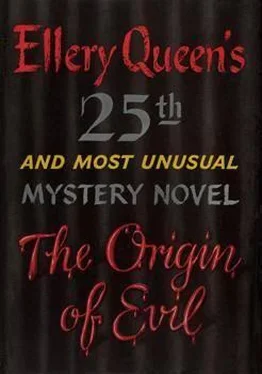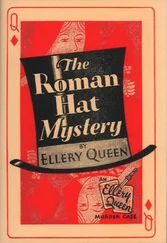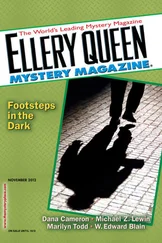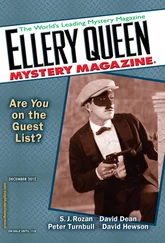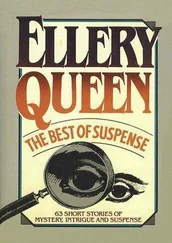“We decided to do a little detecting on our own―”
“That sounds to me,” murmured Ellery, “like the remark of a dissatisfied client.”
“That’s what it is.” Laurel strode around smoking a cigaret. “We’d better have an understanding, Ellery. I hired you to find a killer. I didn’t expect you to produce him in twenty-four hours necessarily, but I did expect something ― some sign of interest, maybe even a twitch or two of activity. But what have you done? You’ve sat here and smoked!”
“Not a bad system, Laurel,” said Ellery, reaching for a pipe. ‘I’ve worked that way for years.”
“Well, I don’t care for it!”
“Am I fired?”
“I didn’t say that―”
“I think all the lady wants to do,” said young Macgowan, “is give you a jab, Queen. She doesn’t think thinking is a substitute for footwork.”
“Each has its place,” Ellery said amiably ― “sit down, Laurel, won’t you? Each has its place, and thinking’s place can be very important. I’m not altogether ignorant of what’s been going on, seated though I’ve remained. Let’s see if I can’t― er― think this out for you...” He closed his eyes. “I would say,” he said after a moment, “that you two have been tracking down the arsenic with which Priam’s tuna was poisoned.” He opened his eyes. “Is that right so far?”
“That’s right,” cried Macgowan.
Laurel glared. “How did you know?”
Ellery tapped his forehead. “Never sell cerebration short. Now! What exactly have you accomplished? I look into my mental ball and I see... you and Mac... discovering a... can of... a can of rat poison in the Priam cellar.” They were open-mouthed. “Yes. Rat poison. And you found that this particular rat poison contains arsenic... arsenic, the poison which was also found in Priam’s salad. How’m I doin’?”
Laurel said feebly, “But I can’t imagine how you...”
Ellery had gone to the blondewood desk near the window and pulled a drawer open. Now he took out a card and glanced over it. “Yes. You traced the purchase of that poison, which bears the brand name of D-e-t-h hyphen o-n hyphen R-a-t-z. You discovered that this revoltingly named substance was purchased on May the thirteenth of this year at... let me see... at Kepler’s Pharmacy at 1723 North Highland.”
Laurel looked at Macgowan. He was grinning. She glared at him and then back at Ellery.
“You questioned either Mr. Kepler himself,” Ellery went on, “or his clerk, Mr. Candy ― unfortunately my crystal ball went blank at this point. But one of them told you that the can of Deth-on-Ratz was bought by a tall, handsome man whom he identified ― probably from a set of snapshots you had with you ― as Alfred Wallace. Correct, Laurel?”
Laurel said tightly, “How did you find out?”
“Why, Red, I leave these matters to those who can attend to them far more quickly and efficiently than I ― or you, Red. Or the Atomic Age Tree Boy over here. Lieutenant Keats had all that information within a few hours and he passed it along to me. Why should I saute myself in the California sun when I can sit here in comfort and think?” Laurel’s lip wiggled and Ellery burst into laughter. He shook up her hair and tilted her chin. “Just the same, that was enterprising of you, Laurel. That was all right.”
“Not so all right.” Laurel sank into a chair, tragic. “I’m sorry, Ellery. You must think I’m an imbecile.”
“Not a bit of it. It’s just that you’re impatient. This business is a matter of legs, brains, and bottoms, and you’ve got to learn to wait on the last-named with philosophy while the other two are pumping away. What else did you find out?”
“Nothing,” said Laurel miserably.
“I thought it was quite a piece,” said Crowe Macgowan. “Finding out that Alfred bought the poison that knocked Roger for a loop... that ought to mean something, Queen.”
“If you jumped to that kind of conclusion,” said Ellery dryly, “I’m afraid you’re in for a bad time. Keats found out something else.”
“What’s that?”
“It was your mother, Mac, who thought she heard mice in the cellar. It was your mother who told Wallace to buy the rat poison.”
The boy gaped, and Laurel looked down at her hands suddenly.
“Don’t be upset, Mac. No action is going to be taken. Even though the mice seem to have been imaginary ― we could find no turds or holes... The fact is, we have nothing positive. There’s no direct evidence that the arsenic in Priam’s tuna salad came from the can of rat poison in the cellar. There’s no direct evidence that either your mother or Wallace did anything but try to get rid of mice who happen not to have been there.”
“Well, of course not.” Macgowan had recovered; he was even looking pugnacious. “Stupid idea to begin with. Just like this detective hunch of yours, Laurel. Everything’s under control. Let’s leave it that way.”
“All right,” said Laurel. She was still studying her hands.
But Ellery said, “No. I don’t see it that way. It’s not a bad notion at all for you two to root around. You’re on the scene―”
“If you think I’m going to rat on my mother,” began Crowe angrily.
“We seem to be in a rodent cycle,” Ellery complained. “Are you worried that your mother may have tried to poison your stepfather, Mac?”
“No! I mean ― you know what I mean! What kind of rat ― skunk do you think I am?”
“I got you into this, Mac,” Laurel said. “I’m sorry. You can back out.”
“I’m not backing out! Seems to me you two are trying to twist every word I say!”
“Would you have any scruples,” asked Ellery with a smile, “where Wallace is concerned?”
“Hell, no. Wallace doesn’t mean anything to me. Delia does.” Her son added, with a sulky shrewdness, “I thought she did to you, too.”
“Well, she does.” The truth was, Keats’s information about Delia Priam and the rat poison had given him a bad time. “But let’s stick to Wallace for the moment. Mac, what do you know about him?”
“Not a thing.”
“How long has he been working for your stepfather?”
“About a year. They come and go. Roger’s had a dozen stooges in the last fifteen years. Wallace is just the latest.”
“Well, you keep your eye on him. And Laurel―”
“On Delia,” said Macgowan sarcastically.
“Laurel on everything. Keep giving me reports. Anything out of the ordinary. This case may prove to be a series of excavations, with the truth at the bottom level. Dig in.”
“I could go back to the beginning,” mumbled Laurel, “and try to trace the dead dog...”
“Oh, you don’t know about that, do you?” Ellery turned to the writing desk again.
“About the dog?”
He turned around with another card. “The dog belonged to somebody named Henderson who lives on Clybourn Avenue in the Toluca Lake district. He’s a dwarf who gets occasional work in films. The dog’s name was Frank. Frank disappeared on Decoration Day. Henderson reported his disappearance to the Pound Department, but his description was vague and unfortunately Frank had no license ― Henderson, it seems, is against bureaucracy and regimentation. When the dog’s body was picked up at your house, Laurel, in view of its lack of identification it was disposed of in the usual way. It was only afterward that Henderson identified the collar, which was returned to him.
“Keats has seen the collar, although Henderson refuses to part with it for sentimental reasons. Keats doubts, though, that anything can be learned from it. There’s no trace of the little silver box which was attached to the collar. The receipt Henderson signed at the Pound Department mentions it, but Henderson says he threw it away as not belonging to him.
Читать дальше
